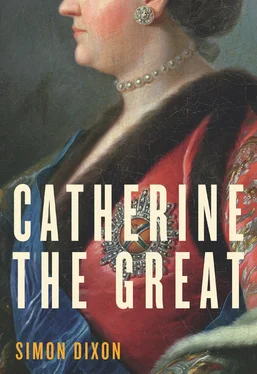On seeing her for the first time, it was impossible not to be struck by her beauty and majestic bearing. She was a large woman who, in spite of being very stout, was neither disfigured by her size, nor embarrassed in her movements; her head, too, was very beautiful. 33
Sophie would soon come to suspect that Elizabeth’s ‘good looks and natural sloth had significantly spoiled her character’. ‘Her beauty ought to have saved her from the envy and rivalry she exhibited against every woman who wasn’t remotely hideous; but in fact, the anxiety not to be outdone by anyone else was the cause of the extreme jealousy which often threw her into bouts of captiousness unworthy of her majesty.’ 34At this first meeting, however, the star-struck girl followed dutifully as Elizabeth, wearing a huge hooped skirt, embroidered in silver and gold, with a black feather to one side of her head and diamonds in her hair, admitted them to the state bedroom. There they spoke in French for about half an hour before retiring to eat, observed incognito by the empress, who dined separately during the Lenten Fast. 35
Next day, Peter’s birthday, Sophie caught her first sight of Aleksey Razumovsky, ‘one of the most handsome men I have seen in my life’. 36He had first been listed among Elizabeth’s servants in 1731, when he was recruited to join the ranks of other talented Ukrainian singers in the Court choir. He soon caught the eye of a princess devoted to Orthodox chant, and even when a throat infection ruined his voice, forcing him instead to take up the bandura (a large Ukrainian mandolin), his dashing looks were enough to preserve the spell. Before long, he and the tsarevna were sharing a bed. They may even have married in secret in 1742, though neither this ceremony nor persistent rumours of children have ever been substantiated. Still, there is no doubt that the languid Razumovsky—the most equable of men unless roused by drink—was Elizabeth’s right-hand man until the end of the 1740s. Revelling in the riches she bestowed upon him, including vast estates at Kozelets in his native Chernigov province, he took no active part in either her coup or her subsequent government. But to judge from the number of petitions he received and the fawning attitude of the empress’s ministers, many Russians shared the view of the Saxon envoy that she hung on his every word. 37Even if such judgements depended on a widespread misapprehension that only men were fit to rule, Aleksey was at his mistress’s side on all major Court occasions as Grand Master of the Hunt. Now he was on hand to pass her the insignia of the Order of St Catherine, which she presented to Sophie and her mother ‘in a ritual of sorority that simultaneously welcomed them as “princesses of the blood” and placed them formally under Elizabeth’. 38
Since the empress customarily took her annual communion after confession at the end of the first week of the Lenten Fast, Sophie’s first experience of the incense-filled world of the Russian Orthodox Church was one of the most emotional services in the ecclesiastical calendar. In the mocking phrase of a later foreign diplomat, Lent was a time when ‘mushrooms, pickled cucumber, prayers and priests succeed to the active dance, the becoming dress, the genial banquet and the gallant officers’ and when Court ladies were left with nothing ‘to subsist on but faith, hope and meditation—faith in the constancy of their lovers, hope that the same dear delusions may return, and meditation upon pleasures past’. 39In 1744, however, the conventional routine was broken by a hectic round of social gatherings as the curious Russian elite scrambled to meet the new arrivals and they in their turn settled into the endless games of cards with which the Court passed the time between Lenten vigil services. Elizabeth herself occasionally called on Sophie and her mother as a sign of her satisfaction with them. Indeed, when the empress set out at the beginning of March on one of her frequent pilgrimages to the Trinity monastery, forty miles north-east of the old capital, all seemed set fair for the future. 40
Disaster struck on the following Tuesday when Sophie suffered an attack of pleurisy, the first serious illness she had ever experienced. Convinced that it must be smallpox, Johanna Elisabeth refused to allow doctors to bleed her daughter, alleging that her brother, Karl Friedrich, had perished under similar treatment in Russia in 1727. While the bickering continued, Sophie lapsed into a state of delirium until the Saturday, when Elizabeth returned to take command. With the agitated Johanna Elisabeth in attendance, she held the girl’s head in her arms as a surgeon opened the first vein. Over the following four weeks, while her mother was kept out of the way and the empress offered prayers for her recovery in a variety of Moscow churches, bleedings were repeated with a vengeance, sometimes as often as four times a day. It is hard to be sure of the effects of this treatment. Sophie certainly did not lack for medical expertise. Abraham Boerhaave, Peter’s doctor, was related to the celebrated Dutch specialist, Herman Boerhaave, while the empress’s personal physician, António Sanches (1699–1783), a baptised Portuguese Jew who had studied with Boerhaave at Leiden, was a specialist in venereal disease who later published a treatise on the curative powers of steam baths. 41Yet if her memoir is to be believed, it was not until an abscess on one of her inflamed lungs burst of its own accord that their severely weakened patient began to regain her strength. She managed her first tentative steps around her bedroom at the beginning of April. Though this episode is understandably thought to have bequeathed a lifelong suspicion of doctors, it is worth remembering the tribute she paid to Sanches and Abraham Boerhaave in 1771: ‘I swear by God that it is to their care that I owe my life.’ Soon after she came to the throne, she rewarded Sanches with an annual pension of 1000 roubles. 42
To Sophie’s anxious Prussian sponsors, her recovery came as a blessed relief. 43The Russian Court expressed its gratefulness with a series of lavish presents, all duly publicised in the official press. Elizabeth had already rewarded the girl’s bravery after the first bleeding with earrings and a diamond cluster variously estimated at between 25,000 and 60,000 roubles. Now more jewels and a diamond watch from the grand duke helped to compensate for Sophie’s distress at having to appear in public at the ball in honour of her fifteenth birthday. Heavily rouged, at the empress’s insistence, she was as ‘thin as a skeleton’ and miserably conscious that her scalp had been shaven as smooth as her hand. ‘I thought I looked frighteningly ugly and was unable to recognise my own features.’ The loss of her hair was especially keenly felt at a time when she ‘had the finest hair in the world: it curled naturally without being waved or crinkled in any way’. 44
More damaging for the pro-Prussian party at Court was Johanna Elisabeth’s behaviour during Sophie’s illness. Well aware that daughters of eighteenth-century princely houses were little more than saleable breeding stock, she had been enterprising in the search for a match for her firstborn. Dizzy with success on arrival in Russia, she failed to grasp that she was bound to lose control of her prized asset as soon as the deal had been done. Instead, still dreaming of a glorious future for herself, she rashly attempted to help topple the pro-Austrian vice chancellor Bestuzhev. Perhaps she had been lulled into thinking that this would be a simple operation by the pro-Prussian courtiers who had watched over her since that first dinner at the Winter Palace. 45No doubt her pretensions had been further inflated by Frederick the Great’s promise to ‘do everything in the world to bring what we have begun to a happy conclusion’. For the king, struggling against Austria for mastery of Germany in the wake of his invasion of Silesia in 1740, Bestuzhev’s removal seemed ‘a sine qua non ’: ‘We need a minister at the Russian Court who would compel the empress to do as we wish.’ 46To achieve this aim, which he regarded as the essential precondition for a triple alliance between Prussia, Russia and Sweden, Frederick was prepared to trust even such an inexperienced agent as Johanna Elisabeth. He was amply repaid for his folly. At the beginning of June, when the king was contemplating a desperate attempt to bribe the vice chancellor to switch sides, Bestuzhev presented the empress with more than seventy decoded dispatches revealing Johanna Elisabeth’s unguarded conversations with his other main enemy, the former French ambassador, the Marquis de la Chétardie. The consequences could hardly have been more embarrassing. Bestuzhev was promoted Chancellor; Chétardie was arrested and escorted to the border; Johanna Elisabeth’s reputation was permanently blackened. Reduced to tears by the empress’s ‘terrible wrath’, she, too, would soon be obliged to return home. 47
Читать дальше












